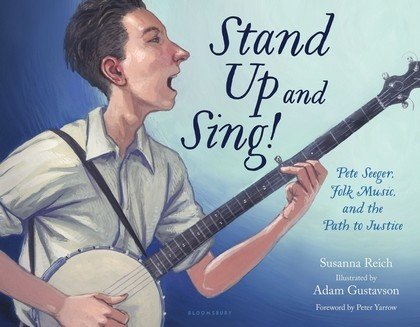Culture & Media
Pete Seeger Remembered: A Conversation With Lara Bergthold

Lara Bergthold remembers the afternoon she and Norman Lear arrived at Pete Seeger’s rustic home overlooking the Hudson River, a house Seeger and his wife Toshi had built themselves years before. Bergthold, a prominent political and communications strategist and former executive director of the Lear Family Foundation, was the associate producer of Pete Seeger: The Power of Song, a 2007 documentary about the famed folksinger and social activist, and had recently brought Lear into the project. The two had been chauffeured from Manhattan in a Mercedes sedan and were eager to discuss ideas to improve the film that had so far been shot by director Jim Brown.
“When we pulled up to his house,” says Bergthold, “Norman and I get out of the back, and Pete walked around us and to the driver and shook his hand and invited him to come in for salad. He considered the driver to be the person he should greet first and it didn’t matter that the driver was a nameless person. That was not for show, that was just who he was.”
When Seeger died Monday at the age of 94, he left behind a legacy of tolerance, optimism and an unbreakable faith in the common man. His career as a musician rode an arc familiar to many of his generation. He had embraced youthful radicalism and paid for it during the Red Scare when a rising career with the Weavers was shattered by the entertainment blacklist. But only temporarily. Despite a contempt citation issued by the House Un-American Activities Committee, Seeger was able to bounce back on the touring circuit, and his mastery of the banjo and guitar helped launch the folk music revival of the late 1950s and early 1960s. His renewed fame made him a forceful spokesman for the civil rights, antiwar and environmental movements.
For Bergthold, whose parents had been Peace Corps volunteers, folk music had been an integral part of her childhood, and she had been an early fan of Seeger’s.
“There were so many songs I knew that he had written or sung,” she says. “‘If I Had a Hammer,’ ‘We Shall Overcome,’ ‘Waist Deep in the Big Muddy.’ To Pete, music wasn’t something you buy, it was something that was about driving social change.”
Bergthold fondly recalls her afternoon at Seeger’s: how he sang a cappella for her and Lear and made them a salad for lunch. But above all she was struck by Seeger’s humility.
“I never met someone who was so not about the commerce of the entertainment industry,” she says. “I was told that when he signed his tax returns he put a piece of paper over that part [that showed his earnings], because he really didn’t want to know – he didn’t want to live and traffic in that world. He made all his business decisions based on his core values.”
Despite his commercial successes, Seeger was content to live a simple life in Upstate New York, with no need to be plugged into the entertainment world.
“For somebody who had been such an inspiration to other musicians, he lived culturally way out of it,” Bergthold says. “He wasn’t fazed by any celebrity. After the documentary premiered we had a party in a penthouse in Tribeca and there were all these people there. But Pete was in the bedroom playing with his grandkids. There was nothing in his public life that you wouldn’t have seen in private.”
Seeger died a man without regrets for his commitment to spreading justice and equality in America. He outlived the blacklist and even, says Bergthold, “the accusation that probably dogged him most in his career, which was that he had cut Bob Dylan’s electric cord with an axe at the Newport Folk Festival. He said it never happened.”
Seeger leaves behind a country that grew up on his music and several generations of activists that carry on his work.
“He was an incredibly important figure for me,” says Bergthold, “and if I had never met him I would have heard this news today and felt saddened that an era had passed. I have met people who heard Pete sing at their kid’s camp and who grew up and went to law school because they wanted to make a difference. I have heard that over and over again. Those ripples are huge.”
-

 State of InequalityApril 4, 2024
State of InequalityApril 4, 2024No, the New Minimum Wage Won’t Wreck the Fast Food Industry or the Economy
-

 State of InequalityApril 18, 2024
State of InequalityApril 18, 2024Critical Audit of California’s Efforts to Reduce Homelessness Has Silver Linings
-

 State of InequalityMarch 21, 2024
State of InequalityMarch 21, 2024Nurses Union Says State Watchdog Does Not Adequately Investigate Staffing Crisis
-

 Latest NewsApril 5, 2024
Latest NewsApril 5, 2024Economist Michael Reich on Why California Fast-Food Wages Can Rise Without Job Losses and Higher Prices
-

 California UncoveredApril 19, 2024
California UncoveredApril 19, 2024Los Angeles’ Black Churches Join National Effort to Support Dementia Patients and Their Families
-

 Latest NewsMarch 22, 2024
Latest NewsMarch 22, 2024In Georgia, a Basic Income Program’s Success With Black Women Adds to Growing National Interest
-

 Latest NewsApril 8, 2024
Latest NewsApril 8, 2024Report: Banks Should Set Stricter Climate Goals for Agriculture Clients
-

 Striking BackMarch 25, 2024
Striking BackMarch 25, 2024Unionizing Planned Parenthood




















